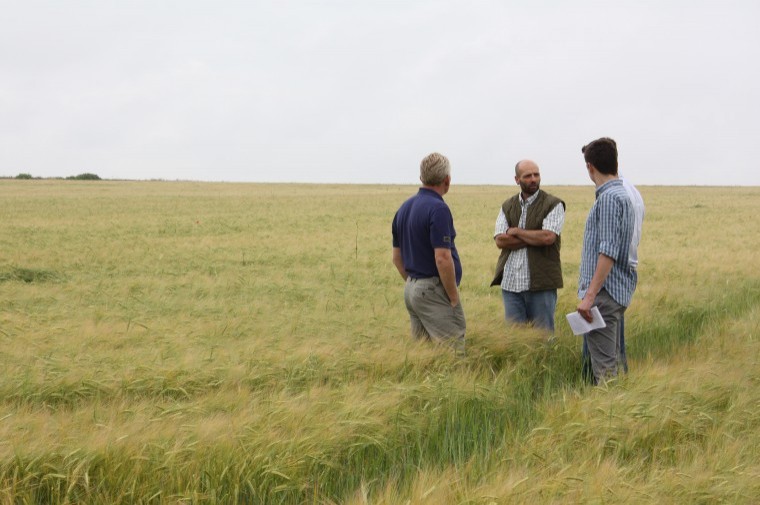Out of the three farms involved in the field lab, one farmer has seen yields increase 35-50% on the fields tested in the first year of application, and all farms have seen increases in soil fungi. Compost tea was sprayed on 45 hectares of test areas three times during the field lab, from April to June, and fields ranged from peat soil to calcium dominated soil.
Sophie Alexander of Hemsworth Farm said that while these initial results are promising – more research is definitely needed. The team at Hemsworth are committed to using and testing compost teas again this year to find out more about their effect. The initial trials were not replicated within fields, but were carried out on four different sites.
The Innovative Farmers field lab began in March 2014, linking a group of farmers including organic and non-organic arable farmers from across England, and one apple grower, with researchers from the Organic Research Centre.
Liz Bowles, head of farming at the Soil Association, is co-ordinating the group. She said: “The results of the compost tea field lab are very positive at one of the farms but we now need to repeat and extend the trials. Innovative Farmers helps farmers carry out more reliable trials at scale – in this field lab we have three farms and 45 hectares involved in the trial. By testing compost teas on different farms, with different soils, we can find out more about the effects that compost teas can have on soil microbiology.”
An estimate of the cost benefit of using compost teas suggests that for the first 10% increase in yield on an organic farm, the financial benefit from use of compost teas after costs was around £18/ha. For every further increase of 10% in yield, the additional benefit was estimated to be around £70/ha. Increases in yield at the three trial sites ranged from 10% to around 50%.
At all trial sites increases in active fungi, flagellates and amoebae were significant (full report available to Innovative Farmers members here). The presence of active fungi is essential for effective nitrogen and phosphorous absorption in crops. Fungi are one type of micro-organism in soil that forms symbiotic relationships with plants roots, breaking down complex carbon compounds and returning nitrogen to the soil – which subsequently allows the crop to absorb more nitrogen and phosphorous, essential as fertiliser.
Sophie Alexander, of Hemsworth Farm, said; “I first read about the compost tea brewer a few years ago and was intrigued. Through the Soil Association I found out about the Innovative Farmers group, and discovered that I wasn’t alone in my fascination. I joined the group and ran trials across 40 ha of spring barley at Hemsworth – I had initially thought of trialling compost teas off the back of a quad bike with a back-pack sprayer!
“I will be continuing with the Innovative Farmers group as although we have had amazing results this year I am unsure how accurate they are – it’s only our first year using compost teas.
“By spraying the same 40 ha we will be able to determine if there is a cumulative effect of the compost teas on the soil and our crops. Last year we sprayed in April, May and June and I plan to do the same again this year. I am also going to continue the experiment into our spring wheats elsewhere on the farm. That seems to be the logical progression for our farm. We’ve had such good results it would be stupid not to repeat.”
Each farm involved in the Innovative Farmers field lab had a full biology and chemistry soil test to analyse the soil microbiology before the trial began. Martin Lishman Ltd helped members of the group learn about the precise requirements for making and applying compost teas effectively.
Innovative Farmers is a not-for-profit network giving farmers support and funding on their own terms. It helps farmers find lasting solutions to practical problems, from managing weeds and pests with fewer chemicals to testing more sustainable animal feeds through on-farm field labs. Together farmers are finding new ways to grow better food, cut waste and pollution, and protect their farm from volatility.
LEAF (Linking Environment and Farming), Innovation for Agriculture, the Organic Research Centre and the Soil Association have teamed up to support Innovative Farmers. The network is part of the Duchy Future Farming Programme, funded by the Prince of Wales’s Charitable Foundation and backed by Waitrose.




